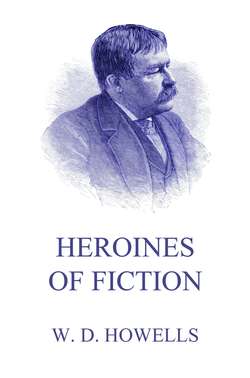Читать книгу Heroines Of Fiction - William Dean Howells - Страница 14
На сайте Литреса книга снята с продажи.
V
ОглавлениеIt was an age when in a lady's house, and almost in the presence of the man who loves her, a young girl could be pursued by the impudent addresses of men who thought her too poor and too humble for marriage. This is Evelina's fate, which she thinks hard, but does not seem to think exceptional; though she is at least preserved from being carried off by such a man. She is indeed inveigled from her friends at the opera by Sir Clement Willoughby, who had known her only as a gentleman might know a young lady in society nowadays, and hurried into his chariot (it looks like a coupé in the old pictures), to be driven anywhere but to her chaperon's address. She saves herself by putting her head out of the window and screaming; then he drives home with her; but the incident does not seem to put an end to their acquaintance, or even to his professions of love. Nothing does that but her engagement to Lord Orville, who, till he asks her to marry him, could not have seen anything so very monstrous in Sir Clement Willoughby's behavior, though he would himself have been incapable of it.
The elopement as a popular means of moving the reader flourished much longer in fiction; but apparently the abduction, which had been so frequently and so effectively employed, was already going out; and in Evelina we find it reduced to such a poor attempt as Sir Clement Willoughby's. It was perhaps going out in society, but it would not be safe to say it had gone out. Probably in the last decades of the century, an heiress would not, even in Ireland, be attacked by her cousin in her uncle's presence, and carried off shrieking, with her clothes half torn from her person, to be tied hand and foot and bound upon a horse behind her captor; or, when she had flung herself to the ground and got possession of a sword for her defense, would be savagely stabbed by one of the abducting party, and then buried to her chin in a bog to hide her from the pursuit of her rescuers. But all this happened about 1745 to Miss Macdermot, who saved herself from a forced marriage with her abductor by catching a pipkin of hot milk from the fire and flinging it into the face of the officiating priest.
Horace Walpole sneered, and probably with reason, at Richardson's novels as pictures of English high life. The old printer, who once had all Europe thrilling over his pages, must have made many minor mistakes as to the diction and deportment of people of fashion; but doubtless he knew his times very well, and would not go astray in the particulars of an abduction, even an abduction in high life.
In few of the novels before " Evelina " could the reader help being privy to some such high-handed outrage. All over England heroines were carried off in chairs and chariots to lonely country houses, there to be kept at the mercy of their captors till the exigencies of the plot forced their release. It must have been a startling innovation that Evelina should be let off so easily as she was, but even this was not so strange as that in an age of epistolary fiction she should be allowed to portray in herself that character of a bewitching goose that she really was, and that her author should effect this without apparent knowingness, or any manner of wink to the reader. Evelina is a masterpiece, and she could not be spared from the group of great and real heroines. The means of realizing her are now as quaint and obsolete almost as the manners of the outdated world to which she was born. Nobody writes novels in letters anymore; just as people no longer call each other Sir and Madam, and are favored and obliged and commanded upon every slight occasion; just as young ladies no longer cry out, when strongly moved, "Good God, sir," in writing to their reverend guardians; or receive prodigious compliments; or make set speeches, or have verses to them posted in public places; or go to amusements where they are likely to be confused with dubious characters. Evelina is forced to see and to suffer things now scarcely credible, and it is her business in the long letters she writes her foster-father to depict scenes of vulgarity among her city cousins which make the reader shudder and creep. She depicts other scenes among people of fashion which are not less vulgar, and are far crueler, like that where two gentlemen of rank have two poor old women run a race upon a wager and push the hapless creatures on to the contest with cheers and curses. A whole world of extinct characters and customs centers around her; but she outlives them all in the inextinguishable ingenuousness of a girlish mind which nothing pollutes, and in the purity of a nature to which everything coarse and unkind is alien. She is tempted at times to laugh at things that other people think funny, but she seems a little finer even than her inventor in all this, and it appears less Evelina than Miss Burney who expects you to enjoy the savage comedy of Captain Mervin's insulting pranks at the expense of Madame Duval. In fine, Evelina, though a goose, is perhaps the sweetest and dearest goose in all fiction. We laugh at her (we must not forget that it is she herself who lets us laugh at her), but we love her, and we rejoice in the happiness which she finds so supernally satisfying, as she passes out of the story, panting with rapturous expectation of bliss in keeping of Lord Orville.
